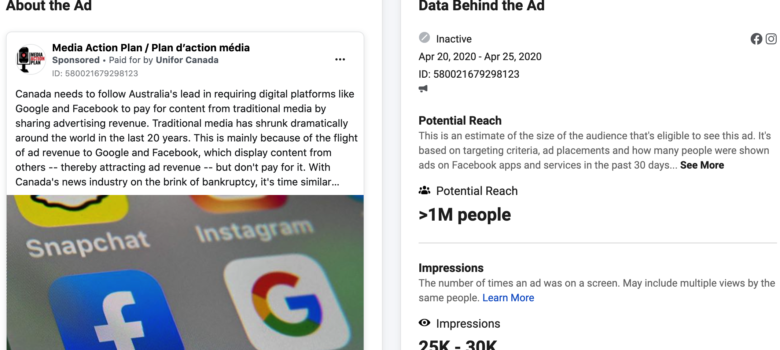Earlier this week, I posted on the lobbying campaign of News Media Canada, the group representing the major Canadian news media publishers, to call for the creation of a government digital media regulatory agency that would have the power to establish mandated payments for linking to news articles on social media sites, establish what content is prioritized on those sites, and potentially issue fines in the hundreds of millions of dollars. The report inaccurately describes the proposed Australian approach upon which it is modelled, avoids acknowledging that payments would be for links, and would open the door to hundreds of millions on tariff retaliation.
The post recounts the remarkable coverage of the report in the mainstream media, particularly from Postmedia and the Toronto Star, who have together published numerous stories and opinion pieces expressing support for link licensing. Moreover, the two media companies have actively used social media to promote their articles, with Postmedia alone posting a link to its lead article on the issue 21 times on Facebook.
Yet the campaign to convince the government that Facebook should be required to pay for links to articles that the news publishers have posted themselves is not the first time that the social media site has been used to advance the mandated payments policy. In fact, a review of data from the Facebook Ad Library reveals that supporters of mandated payments have used paid advertising on Facebook to promote the issue. In other words, even as some argue that Facebook should pay for linking to news articles, they are paying Facebook for featuring links to those same articles.
Earlier this year, the Unifor Canada spent thousands of dollars on Facebook to promote its Media Action Plan, which calls for mandated payments from Facebook and Google. The paid advertising campaign featured links to stories from the Globe and Mail on the Australian policy approach and an op-ed from Unifor’s Jerry Dias, as well as a link to a Toronto Star op-ed from Edward Greenspon. The campaign also included ads for taxing Facebook and Google (with links to a BBC story) and mandating Cancon payments from Netflix. The ads notably also featured Friends of Canadian Broadcasting in a joint video with Unifor Canada calling for mandated payments from Internet streaming companies. Friends of Canadian Broadcasting participation in paid advertising on Facebook that generates profit for the social media giant is ironic given that its website proclaims that “Facebook makes $2 billion a year with content stolen from Canadian journalists.”
Despite the “stolen content” rhetoric, the willingness of the policy supporters to pay for links is evidence of their value. Further, in case it isn’t obvious, these ads actually are an example of Facebook commercially benefiting from links to news articles. Unlike typical posts of news stories – many of which come from the news publishers themselves and do not directly generate revenue – ad campaigns such as this one directly result in revenue for Facebook. Given their position on payments, it would be interesting to know whether Unifor Canada obtained a paid licence to link to the stories on the Globe and Mail, Toronto Star, BBC, and other media sources as part of its ad campaign.








Pingback: ● NEWS ● #MichaelGeist #socialcontrolmedia #copyright ☞ What’s Anot… | Dr. Roy Schestowitz (罗伊)
Pingback: News of the Week; November 4, 2020 – Communications Law at Allard Hall
Helpful information. Lucky me I found your web site unintentionally, and I’m stunned why this
coincidence did not happened in advance! I bookmarked it.